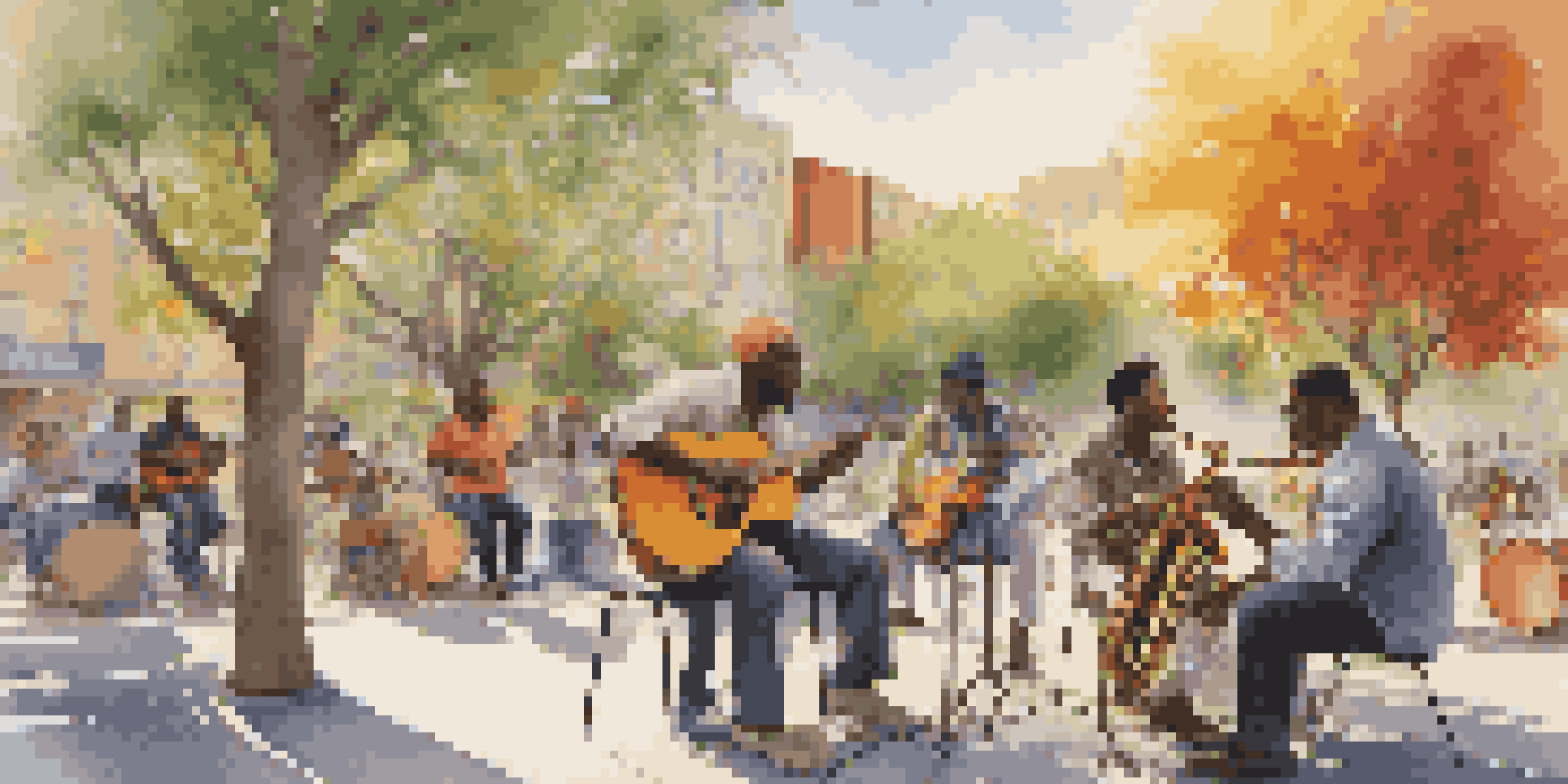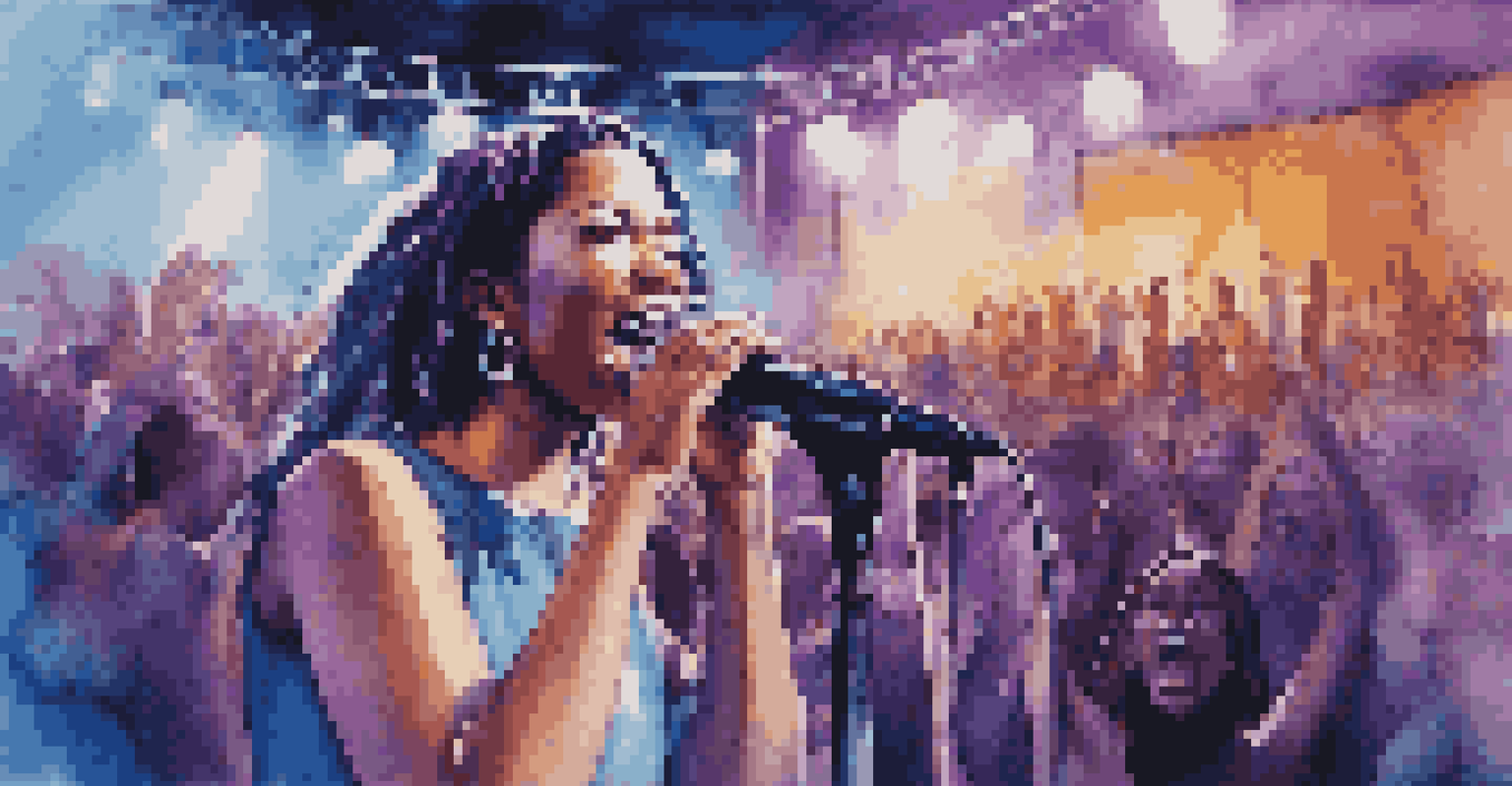How Globalization Shapes Music's Role in Political Activism

Understanding Globalization and Its Cultural Impact
Globalization is the process of increased interconnectedness among countries, often driven by trade, technology, and cultural exchange. This phenomenon has made it easier for music from different parts of the world to reach diverse audiences. As a result, artists can draw inspiration from a variety of cultural backgrounds, enriching their sound and message.
Music is the universal language of mankind.
For instance, a hip-hop artist from the United States might collaborate with a reggae musician from Jamaica, blending genres and ideas. This mixing not only creates unique music but also fosters an understanding of different social issues. It allows artists to address global concerns, such as inequality and human rights, through their art.
As music travels across borders, it carries with it the stories and struggles of various communities. This global exchange can amplify the voice of marginalized groups, making it an essential tool for political activism.
The Role of Music in Political Movements
Music has long been a powerful tool for political movements, acting as a rallying cry for change. From the civil rights anthems of the 1960s to contemporary protest songs, music unites people under a common cause. It not only motivates individuals but also serves as a medium to spread awareness about pressing social issues.

For example, songs like 'Fight the Power' by Public Enemy became anthems for the fight against racial injustice in the U.S. Similarly, global movements such as the Arab Spring saw music play a crucial role in mobilizing youth and expressing dissent. These songs resonate with listeners and inspire collective action.
Globalization Enriches Music Diversity
The interconnectedness of countries enhances music by allowing artists to blend various cultural influences, creating unique sounds and messages.
As globalization allows these songs to reach audiences worldwide, they also encourage solidarity among movements in different countries. The shared experience of music can transcend cultural barriers, reinforcing the message of unity in activism.
Case Studies: Music and Activism Around the World
There are numerous examples of how music has been used in political activism globally. In South Africa, during the apartheid era, artists like Miriam Makeba and Hugh Masekela used their music to fight against racial segregation. Their songs not only provided a soundtrack for resistance but also garnered international attention for their cause.
The power of music makes all the difference in the world.
Similarly, in the Middle East, artists have utilized social media platforms to share their music and messages of hope and resistance. For instance, the song 'We Are All Egypt' became a rallying cry during the Egyptian revolution, uniting people across various demographics. This shows how music can be a unifying force, even in times of turmoil.
These case studies highlight the transformative power of music as a tool for activism. They showcase how artists harness their creativity to inspire change and challenge oppressive regimes, often resonating with audiences far beyond their own borders.
The Impact of Social Media on Music and Activism
In today's digital age, social media plays a pivotal role in the intersection of music and activism. Platforms like Twitter, Facebook, and Instagram allow artists to share their music and messages instantly with a global audience. This accessibility can rapidly mobilize support for various causes, amplifying the impact of their activism.
For example, the #BlackLivesMatter movement saw artists using their platforms to share songs, videos, and messages that resonate with the fight for racial justice. The viral nature of social media means that a single post can spark widespread awareness and action, showcasing the power of music in advocacy.
Music Fuels Political Movements
Throughout history, music has served as a rallying cry for change, uniting people and spreading awareness about social issues.
Moreover, social media creates a space for dialogue and community building among activists and artists. This connectivity fosters collaboration, allowing for innovative expressions of solidarity and support through music.
Challenges Faced by Activist Musicians
While music can be a powerful force for change, activist musicians often face significant challenges. Many artists risk censorship or backlash from governments when tackling sensitive political issues through their music. This can lead to threats, imprisonment, or even violence against those who dare to speak out.
For instance, in countries with strict regimes, musicians who criticize the government may find their music banned or themselves silenced. This reality can discourage artists from using their platforms for activism, limiting the diversity of voices in the global music landscape.
Despite these challenges, many artists continue to push boundaries and advocate for change. Their courage highlights the resilience of music as a tool for activism, as they strive to raise awareness and inspire action, even in the face of adversity.
The Future of Music and Political Activism
As globalization continues to evolve, the role of music in political activism will likely expand. With emerging technologies and platforms, artists have more opportunities than ever to connect with global audiences. This presents an exciting landscape for the fusion of music and social movements.
Looking ahead, we may see more collaborations between artists from different cultural backgrounds, leading to innovative new genres and powerful messages. As these collaborations gain traction, they can create a more inclusive space for activism, allowing diverse voices to be heard.
Social Media Amplifies Activism
In the digital age, social media empowers artists to rapidly share music and messages, mobilizing support for various causes on a global scale.
In a world increasingly shaped by global challenges, music will remain a vital tool for fostering understanding and inspiring action. The continued intersection of globalization and activism through music promises to shape the future of social movements worldwide.
Conclusion: The Enduring Power of Music in Activism
In summary, the relationship between globalization, music, and political activism is a dynamic and influential one. Music transcends borders, bringing people together and amplifying voices that need to be heard. As artists continue to navigate the complexities of global issues, their music serves as both a reflection of the times and a catalyst for change.
The stories of musicians who bravely stand up for their beliefs remind us of the potential of art to inspire action and foster unity. As we move forward, it is essential to recognize and support these artists, as they play a crucial role in shaping a more equitable world.

Ultimately, the enduring power of music in activism lies in its ability to connect us all, reminding us that, regardless of our backgrounds, we share common struggles and aspirations for a better future.